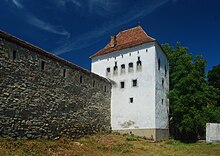
Bistrița is the capital of Bistrița-Năsăud County in northern Transylvania, Romania.
Understand
editBistriţa was founded in the early 13th century by German settlers and (due to its location on the main trading route with Moldavia) became one of Transylvania's major Medieval cities. Several interesting sites from that time survive in the city's old quarter. Some tourists are also attracted by the fact that the town serves as Jonathan Harker's introduction to Romania in Bram Stoker's novel Dracula.
Get in
editBy train
editBistriţa is on a secondary railway and gets limited service: a few local trains, several regional trains (note there are different operators) from Cluj (a three hours trip) and a night train from Bucharest (nine hours) via Brasov. Schedules can be found using the online route planner from infrastructure operator CFR.
By car
editBistriţa is located on the DN17 road linking Transylvania with Southern Bucovina.
By bus
editThere are frequent buses from Cluj (two hours travel time), three-four buses from Suceava (four hours and half), Târgu Mureş (three hours) and one bus from Iaşi (seven hours). Some of their schedules are available on autogari.ro .
Get around
editThe relatively compact old quarter can be visited on foot. The rest of the city is covered by several minibus lines operated by Transmixt.
See
edit
Landmarks
edit- 1 Turnul Dogarilor (Cooper's tower), strada Dogarilor nr. 18. One of the few remaining parts of Bistriţa's medieval fortifications, it now houses a dolls and masks museum
- 2 Sugălete (Sugălete row), Piaţa Centrală. A group of thirteen connected homes built in the 14th-16th centuries
- Casa Ion Zidaru, Piaţa Centrală nr. 30. One of the best examples of late Gothic architecture in Transylvania
- Casa Argintarului (Silversmith's house), strada Dornei nr. 5. A beautiful 16th century Renaissance house
Religious sites
edit- 3 Biserica Evanghelică (Evangelical church), Piaţa Centrală. First built in the second half of the 14th century, has one of the highest Gothic towers in Transylvania
- 4 Biserica Intrarea Maicii Domnului în Biserică (Presentation of the Virgin Mary church), Piaţa Unirii. A former Catholic monastery built in the late 13th century, now an Orthodox church
- 5 Sinagoga (The synagogue), strada General Grigore Bălan nr. 10. Built in 1856 by the once thriving Jewish community
Museums
edit- 6 Muzeul judeţean Bistriţa Năsăud (Bistriţa Năsăud county museum), strada General Grigore Bălan nr. 19. Tu-Su 10AM-6PM (summer), 9AM-5PM (winter). Has ethnography, art, archeology, historical and geology collections
Do
editBuy
editEat
editDrink
editSleep
editBudget
edit- Pensiunea Old Sheriff, DN17 nr. 252A (in Unirea suburb), ☏ +40 748 738 022. Here you have a nice porch from which to watch the birds and things since it's kind of out in the country. 114 lei.
- Pensiunea Miracolo, DN17 nr. 445 (in Unirea suburb), ☏ +40 742 039 966, pensiune@miracolo.ro. This is landscaped very nicely and looks a bit like a big country farm. €15-28.
- Hotel Minerva, Strada Compozitorilor nr.2, ☏ +40 263 234156, rezervari@hotel-minerva.ro. This is a bit of a plain-Jane on the outside, but at least it has a pool (outdoor). €21-35.
Mid-range
edit- Hotel Diana, Calea Moldovei nr. 80, ☏ +40 263 231 960, fax: +40 263 231961, dianahotel@dianahotel.ro. Check-in: 14.00, check-out: 12.00. This hotel with a very European-feel has a restaurant to cater to your appetite. €31-53.
- Hotel Codrisor, Strada Codrişor nr. 28, ☏ +40 263 233814, fax: +40 263 236476, hotel@hotelcodrisor.ro. It's big and yellow sitting alongside the Bistrita River, and you can get a hot dog with your dinner at the restaurant. €27-62.
- Hotel Bistrita, Piaţa Petru Rareş nr.2, ☏ +40 263 231154, fax: +40 263 231826, hotel@hotel-bistrita.ro. It's pretty modern and has a dining area. 192 lei.
- Hotel Coroana de Aur (The Golden Crown Hotel), Piaţa Petru Rareş nr.4, ☏ +40 263 211 872, fax: +40 263 232667. Check-in: 14.00, check-out: 12.00. Pretty exquisite when it comes to building class and stateliness, even going so far as possibly having a candalabra on your nightstand. You can enjoy a breakfast buffet here and also a bar and restaurant. 261 lei.

